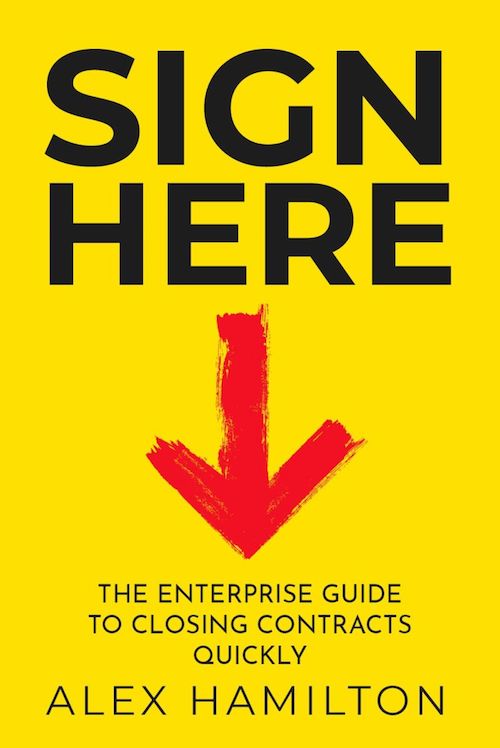Law firm CEO discusses new book, the evolution of contracts and where he thinks contracts are headed

Ari Kaplan. Photo by Lauren Hillary.
Ari Kaplan recently spoke with Alex Hamilton, the CEO of Radiant Law, a U.K.-based law firm focused on contracts, and the author of Sign Here: The Enterprise Guide to Closing Contracts Quickly.
Ari Kaplan: Tell us about your background and your work with Radiant Law.
Alex Hamilton: I had a very conventional career. I started practicing in the U.K. and specialized in technology outsourcing deals, worked in the U.S. for a bit, and became a partner with Latham & Watkins in London. It was a traditional first 15 years, and then I had a Jerry Maguire moment in 2009 when I wrote a memo suggesting that we should focus more on innovation. I left to start Radiant Law in 2011, which is where I have been for the past 10 years.
Ari Kaplan: Would you recommend that others leave a prestigious law firm and start their own practice?
Alex Hamilton: No. It’s completely mad. At the time, people described my decision as brave, which is, of course, the most terrifying thing, and you never want to hear that. It is hard to recommend that someone give up a partnership at a firm like Latham, but on the other side, it’s been incredible and amazing journey for me. So while I would be cautious recommending that anyone else do it, it has been unbelievably satisfying to build something. The fun of Radiant is not only working on fixing the contracting problem by making it a little bit more sane, reasonable and fast, but also trying to create a very different kind of organization where people can thrive.
Ari Kaplan: How has the increased familiarity with the value of new law companies impacted your work?
 Alex Hamilton, the CEO of Radiant Law.
Alex Hamilton, the CEO of Radiant Law.
Alex Hamilton: For a long time, I felt very much out in the wilderness. Of course, now the Big Four have turned up along with others, so the competition is definitely evolving. At Radiant, we take over your day-to-day contracts and as a managed legal service, which has always made a lot of sense to a finance or HR department because they have historically been outsourcing; we are becoming more familiar to legal departments. This option is a lot less touristy, as people are not just coming by to see what we’re up to. They are getting a lot more serious given that the pressures on the legal department have not eased in the slightest. More for less still won’t go away as a topic and demonstrating business value is critical.
Ari Kaplan: Have the projects that Radiant Law manages changed over the past decade?
Alex Hamilton: We started out as an outsourcing technology boutique. We managed a billion-pound deal in our first year, which is also when we started supporting our first managed legal services client. Now, we generally only provide managed legal services and also review and fix contracts to comply with industry changes, such as the GDPR or LIBOR.
Ari Kaplan: What inspired you to write Sign Here: The Enterprise Guide to Closing Contracts Quickly?
Alex Hamilton: Writing a book is a good process to go through to clarify one’s own thinking. I spent the first year of the pandemic basically pacing up and down, in a nice location in South Africa, and trying to align my thoughts toward this outcome.
Ari Kaplan: What type of project management did you follow to get the book finished?
Alex Hamilton: Some parts were super easy in that I just sat down, wrote 500 or 1,000 words a day and keep going. Then there were whole periods where I would get completely stuck, walk around and curse frantically, followed by what seemed like a never-ending series of edits. I had no idea how much editing is required to produce a book. I’m not sure I can convey how to do it right, but it was worth it, albeit through a process that was quite painful.
Ari Kaplan: What do you want readers to take away from the book?
Alex Hamilton: Be reasonable. The book basically conveys that contracting matters, and there are huge pressures from organizations to do it better, yet we are floundering right now. We’re not taking a structured approach to improving contracts, and I talk about the value of repeatable processes, applying simple technology at the robot stage, and then engaging in continuous refinement. That is a message that’s very different from focusing on AI, smart contracts and CLM, as there isn’t a magic silver bullet. After all, the biggest thing you can do with your contracts is make them short, clear, reasonable and relevant, so I am pushing hard for an approach which recognizes that contracts are about creating relationships. As such, why are we going in asking for stupid positions and having stupid conversations about the wrong points when we can actually be focusing on the things that really matter for creating better relationships faster?
Ari Kaplan: Have the form and purpose of contracts evolved?
Alex Hamilton: The whole thing has atrophied into these long, unreasonable terms being sent out and long, unreasonable conversations about them. Not that much has changed in that contracts formalize relationships. There is greater pressure now in a more networked world to be really good at contracting, as the volumes of contracts has increased. Getting it right really matters, and we now have simple technology that makes it a lot easier if it is applied, but we have a lot of data about what’s actually happening in the marketplace through the Radiant scorecard, and most people have not done that much.
Ari Kaplan: Have expectations of contract management changed?

Alex Hamilton: It is moving up the agenda, and organizations like the World Commerce and Contracting Association have done an excellent job of placing the importance of it front and center, but the gap in contracting is putting huge pressure on the legal teams, as it represents the majority of their work. Those who manage contracting well can have a huge impact on the overall performance and welfare of their departments, as well as the ability to meet the expectations of their organization.
Ari Kaplan: How can legal departments filter through the noise of contract management processes and technology to identify what’s best for their organization?
Alex Hamilton: The book establishes a structured approach and highlights techniques that can help. While the options will need to be applied according to each organization independently, many companies have similar challenges, so they need to get the basics right. For example, legal teams that map out their processes, agree on reasonable standard terms, not just lengthy standard terms, develop playbooks, and have an effective intake process will be in a better position to manage their contracts. With all of those things in place, you can apply simple technology, such as document assembly and e-signature tools, to enhance the approach. Organizations can achieve success not with magic technology, but often with simple processes, refinement and continuous improvement.
Ari Kaplan: Where do you see the management of contracts headed?
Alex Hamilton: It is all going to be about getting the basics in place. If we can do that, then I think it’s going to be a lot easier for organizations to meet their goals in working with third parties.
Listen to the complete interview at Reinventing Professionals.
Ari Kaplan regularly interviews leaders in the legal industry and in the broader professional services community to share perspective, highlight transformative change and introduce new technology at his blog and on iTunes.
This column reflects the opinions of the author and not necessarily the views of the ABA Journal—or the American Bar Association.



